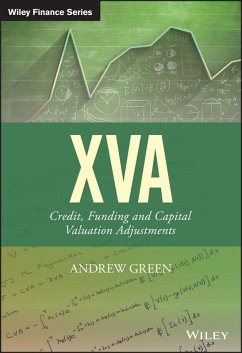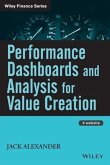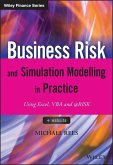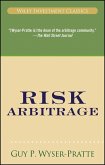

Alle Infos zum eBook verschenken

- Format: ePub
- Merkliste
- Auf die Merkliste
- Bewerten Bewerten
- Teilen
- Produkt teilen
- Produkterinnerung
- Produkterinnerung

Hier können Sie sich einloggen

Bitte loggen Sie sich zunächst in Ihr Kundenkonto ein oder registrieren Sie sich bei bücher.de, um das eBook-Abo tolino select nutzen zu können.
Thorough, accessible coverage of the key issues in XVA XVA - Credit, Funding and Capital Valuation Adjustments provides specialists and non-specialists alike with an up-to-date and comprehensive treatment of Credit, Debit, Funding, Capital and Margin Valuation Adjustment (CVA, DVA, FVA, KVA and MVA), including modelling frameworks as well as broader IT engineering challenges. Written by an industry expert, this book navigates you through the complexities of XVA, discussing in detail the very latest developments in valuation adjustments including the impact of regulatory capital and margin…mehr
- Geräte: eReader
- mit Kopierschutz
- eBook Hilfe
- Größe: 5.64MB
![Capital Ideas Evolving (eBook, ePUB) Capital Ideas Evolving (eBook, ePUB)]() Peter L. BernsteinCapital Ideas Evolving (eBook, ePUB)12,99 €
Peter L. BernsteinCapital Ideas Evolving (eBook, ePUB)12,99 €![Fixed Income Securities (eBook, ePUB) Fixed Income Securities (eBook, ePUB)]() Bruce TuckmanFixed Income Securities (eBook, ePUB)76,99 €
Bruce TuckmanFixed Income Securities (eBook, ePUB)76,99 €![Performance Dashboards and Analysis for Value Creation (eBook, ePUB) Performance Dashboards and Analysis for Value Creation (eBook, ePUB)]() Jack AlexanderPerformance Dashboards and Analysis for Value Creation (eBook, ePUB)47,99 €
Jack AlexanderPerformance Dashboards and Analysis for Value Creation (eBook, ePUB)47,99 €![A Workout in Computational Finance (eBook, ePUB) A Workout in Computational Finance (eBook, ePUB)]() Andreas BinderA Workout in Computational Finance (eBook, ePUB)50,99 €
Andreas BinderA Workout in Computational Finance (eBook, ePUB)50,99 €![Business Risk and Simulation Modelling in Practice (eBook, ePUB) Business Risk and Simulation Modelling in Practice (eBook, ePUB)]() Michael ReesBusiness Risk and Simulation Modelling in Practice (eBook, ePUB)96,99 €
Michael ReesBusiness Risk and Simulation Modelling in Practice (eBook, ePUB)96,99 €![Risk Arbitrage (eBook, ePUB) Risk Arbitrage (eBook, ePUB)]() Guy Wyser-PratteRisk Arbitrage (eBook, ePUB)12,99 €
Guy Wyser-PratteRisk Arbitrage (eBook, ePUB)12,99 €![Corporate and Project Finance Modeling (eBook, ePUB) Corporate and Project Finance Modeling (eBook, ePUB)]() Edward BodmerCorporate and Project Finance Modeling (eBook, ePUB)43,99 €
Edward BodmerCorporate and Project Finance Modeling (eBook, ePUB)43,99 €-
-
-
Dieser Download kann aus rechtlichen Gründen nur mit Rechnungsadresse in A, B, BG, CY, CZ, D, DK, EW, E, FIN, F, GR, HR, H, IRL, I, LT, L, LR, M, NL, PL, P, R, S, SLO, SK ausgeliefert werden.
- Produktdetails
- Verlag: John Wiley & Sons
- Seitenzahl: 536
- Erscheinungstermin: 8. Oktober 2015
- Englisch
- ISBN-13: 9781118556764
- Artikelnr.: 43979181
- Verlag: John Wiley & Sons
- Seitenzahl: 536
- Erscheinungstermin: 8. Oktober 2015
- Englisch
- ISBN-13: 9781118556764
- Artikelnr.: 43979181
Introduction: The Valuation of Derivative Portfolios 1 1.1 What this book
is about 1 1.2 Prices and Values 4 1.2.1 Before the Fall... 4 1.2.2 The
Post-Crisis World... 5 1.3 Trade Economics in Derivative Pricing 6 1.3.1
The Components of a Price 6 1.3.2 Risk-Neutral Valuation 8 1.3.3 Hedging
and Management Costs 11 1.3.4 Credit Risk: CVA/DVA 11 1.3.5 FVA 13 1.3.6
Regulatory Capital and KVA 14 1.4 Post-Crisis Derivative Valuation or How I
Learned to Stop Worrying and Love FVA 16 1.4.1 The FVA Debate and the
Assault on Black-Scholes-Merton 16 1.4.2 Different Values for Different
Purposes 19 1.4.3 Summary: The Valuation Paradigm Shift 21 1.5 Reading this
Book 21 PART ONE CVA and DVA: Counterparty Credit Risk and Credit Valuation
Adjustment CHAPTER 2 Introducing Counterparty Risk 25 2.1 Defining
Counterparty Risk 25 2.1.1 Wrong-way and Right-way Risk 27 2.2 CVA and DVA:
Credit Valuation Adjustment and Debit Valuation Adjustment Defined 27 2.3
The Default Process 28 2.3.1 Example Default: The Collapse of Lehman
Brothers 30 2.4 Credit Risk Mitigants 30 2.4.1 Netting 30 2.4.2
Collateral/Security 31 2.4.3 Central Clearing and Margin 34 2.4.4 Capital
35 2.4.5 Break Clauses 35 2.4.6 Buying Protection 37 CHAPTER 3 CVA and DVA:
Credit and Debit Valuation Adjustment Models 39 3.1 Introduction 39 3.1.1
Close-out and CVA 40 3.2 Unilateral CVA Model 42 3.2.1 Unilateral CVA by
Expectation 42 3.2.2 Unilateral CVA by Replication 43 3.3 Bilateral CVA
Model: CVA and DVA 48 3.3.1 Bilateral CVA by Expectation 48 3.3.2 Bilateral
CVA by Replication 50 3.3.3 DVA and Controversy 53 3.4 Modelling Dependence
between Counterparties 55 3.4.1 Gaussian Copula Model 55 3.4.2 Other Copula
Models 56 3.5 Components of a CVA Calculation Engine 57 3.5.1 Monte Carlo
Simulation 57 3.5.2 Trade Valuation and Approximations 57 3.5.3 Expected
Exposure Calculation 59 3.5.4 Credit Integration 59 3.6 Counterparty Level
CVA vs. Trade Level CVA 59 3.6.1 Incremental CVA 60 3.6.2 Allocated CVA 60
3.7 Recovery Rate/Loss-Given-Default Assumptions 63 CHAPTER 4 CDS and
Default Probabilities 65 4.1 Survival Probabilities and CVA 65 4.2
Historical versus Implied Survival Probabilities 66 4.3 Credit Default Swap
Valuation 67 4.3.1 Credit Default Swaps 67 4.3.2 Premium Leg 69 4.3.3
Protection Leg 71 4.3.4 CDS Value and Breakeven Spread 72 4.4 Bootstrapping
the Survival Probability Function 72 4.4.1 Upfront Payments 74 4.4.2 Choice
of Hazard Rate Function and CVA: CVA Carry 75 4.4.3 Calibration Problems 76
4.5 CDS and Capital Relief 77 4.6 Liquid and Illiquid Counterparties 78
4.6.1 Mapping to Representative CDS 79 4.6.2 Mapping to Baskets and Indices
80 4.6.3 Cross-sectional Maps 81 CHAPTER 5 Analytic Models for CVA and DVA
83 5.1 Analytic CVA Formulae 83 5.2 Interest Rate Swaps 84 5.2.1 Unilateral
CVA 84 5.2.2 Bilateral CVA 86 5.3 Options: Interest Rate Caplets and
Floorlets 86 5.4 FX Forwards 88 CHAPTER 6 Modelling Credit Mitigants 91 6.1
Credit Mitigants 91 6.2 Close-out Netting 91 6.3 Break Clauses 93 6.3.1
Mandatory Break Clauses 93 6.3.2 Optional Break Clauses 93 6.4 Variation
Margin and CSA Agreements 97 6.4.1 Simple Model: Modifying the Payout
Function 97 6.4.2 Modelling Collateral Directly 99 6.4.3 Lookback Method
101 6.4.4 Modelling Downgrade Triggers in CSA Agreements 102 6.5
Non-financial Security and the Default Waterfall 107 CHAPTER 7 Wrong-way
and Right-way Risk for CVA 109 7.1 Introduction: Wrong-way and Right-way
Risks 109 7.1.1 Modelling Wrong-way Risk and CVA 110 7.2 Distributional
Models of Wrong-way/Right-way Risk 111 7.2.1 Simple Model: Increased
Exposure 111 7.2.2 Copula Models 111 7.2.3 Linear Models and Discrete
Models 114 7.3 A Generalised Discrete Approach to Wrong-way Risk 116 7.4
Stochastic Credit Models of Wrong-way/Right-way Risk 118 7.4.1 Sovereign
Wrong-way Risk 119 7.5 Wrong-way/Right-way Risk and DVA 119 PART TWO FVA:
Funding Valuation Adjustment CHAPTER 8 The Discount Curve 123 8.1
Introduction 123 8.2 A Single Curve World 123 8.3 Curve Interpolation and
Smooth Curves 126 8.4 Cross-currency Basis 127 8.5 Multi-curve and Tenor
Basis 128 8.6 OIS and CSA Discounting 129 8.6.1 OIS as the Risk-free Rate
129 8.6.2 OIS and CSA Discounting 131 8.6.3 Multi-currency Collateral and
the Collateral Option 134 8.7 Conclusions: Discounting 138 CHAPTER 9
Funding Costs: Funding Valuation Adjustment (FVA) 139 9.1 Explaining
Funding Costs 139 9.1.1 What is FVA? 139 9.1.2 General Principle of Funding
Costs 145 9.2 First Generation FVA: Discount Models 145 9.3 Double Counting
and DVA 146 9.4 Second Generation FVA: Exposure Models 147 9.4.1 The
Burgard-Kjaer Semi-Replication Model 148 9.5 Residual FVA and CSAs 160 9.6
Asymmetry 161 9.6.1 Case 1: Corporate vs. Bank Asymmetry 161 9.6.2 Case 2:
Bank vs. Bank Asymmetry 162 9.7 Risk Neutrality, Capital and the
Modigliani-Miller Theorem 162 9.7.1 No Market-wide Risk-neutral Measure 162
9.7.2 Consequences 165 9.7.3 The Modigliani-Miller Theorem 165 9.8
Wrong-way/Right-way Risk and FVA 166 CHAPTER 10 Other Sources of Funding
Costs: CCPs and MVA 167 10.1 Other Sources of Funding Costs 167 10.1.1
Central Counterparty Funding Costs 167 10.1.2 Bilateral Initial Margin 170
10.1.3 Rating Agency Volatility Buffers and Overcollateralisation 170
10.1.4 Liquidity Buffers 170 10.2 MVA: Margin Valuation Adjustment by
Replication 171 10.2.1 Semi-replication with no Shortfall on Default 174
10.3 Calculating MVA Efficiently 175 10.3.1 Sizing the Problem 175 10.3.2
Aside: Longstaff-Schwartz for Valuations and Expected Exposures 176 10.3.3
Calculating VaR inside a Monte Carlo 179 10.3.4 Case Study: Swap Portfolios
182 10.3.5 Adapting LSAC to VaR under Delta-Gamma Approximation 184 10.4
Conclusions on MVA 184 CHAPTER 11 The Funding Curve 187 11.1 Sources for
the Funding Curve 187 11.1.1 Term Funding 188 11.1.2 Rolling Funding 188
11.2 Internal Funding Curves 188 11.2.1 Bank CDS Spread 188 11.2.2 Bank
Bond Spread 189 11.2.3 Bank Bond-CDS Basis 189 11.2.4 Bank Treasury
Transfer Price 190 11.2.5 Funding Strategy Approaches 190 11.3 External
Funding Curves and Accounting 191 11.4 Multi-currency/Multi-asset Funding
192 PART THREE KVA: Capital Valuation Adjustment and Regulation CHAPTER 12
Regulation: the Basel II and Basel III Frameworks 195 12.1 Introducing the
Regulatory Capital Framework 195 12.1.1 Economic Capital 196 12.1.2 The
Development of the Basel Framework 196 12.1.3 Pillar I: Capital Types and
Choices 201 12.2 Market Risk 202 12.2.1 Trading Book and Banking Book 202
12.2.2 Standardised Method 202 12.2.3 Internal Model Method (IMM) 204 12.3
Counterparty Credit Risk 205 12.3.1 Weight Calculation 205 12.3.2 EAD
Calculation 206 12.3.3 Internal Model Method (IMM) 208 12.4 CVA Capital 209
12.4.1 Standardised 209 12.4.2 Advanced 211 12.5 Other Sources of
Regulatory Capital 213 12.5.1 Incremental Risk Charge (IRC) 213 12.5.2
Leverage Ratio 213 12.6 Forthcoming Regulation with Pricing Impact 214
12.6.1 Fundamental Review of the Trading Book 214 12.6.2 Revised
Standardised Approach to Credit Risk 218 12.6.3 Bilateral Initial Margin
220 12.6.4 Prudent Valuation 220 12.6.5 EMIR and Frontloading 224 CHAPTER
13 KVA: Capital Valuation Adjustment 227 13.1 Introduction: Capital Costs
in Pricing 227 13.1.1 Capital, Funding and Default 227 13.2 Extending
Semi-replication to Include Capital 228 13.3 The Cost of Capital 232 13.4
KVA for Market Risk, Counterparty Credit Risk and CVA Regulatory Capital
232 13.4.1 Standardised Approaches 232 13.4.2 IMM Approaches 233 13.5 The
Size of KVA 233 13.6 Conclusion: KVA 237 CHAPTER 14 CVA Risk Warehousing
and Tax Valuation Adjustment (TVA) 239 14.1 Risk Warehousing XVA 239 14.2
Taxation 239 14.3 CVA Hedging and Regulatory Capital 240 14.4 Warehousing
CVA Risk and Double Semi-Replication 240 CHAPTER 15 Portfolio KVA and the
Leverage Ratio 247 15.1 The Need for a Portfolio Level Model 247 15.2
Portfolio Level Semi-replication 248 15.3 Capital Allocation 254 15.3.1
Market Risk 255 15.3.2 Counterparty Credit Risk (CCR) 255 15.3.3 CVA
Capital 255 15.3.4 Leverage Ratio 256 15.3.5 Capital Allocation and
Uniqueness 257 15.4 Cost of Capital to the Business 257 15.5 Portfolio KVA
258 15.6 Calculating Portfolio KVA by Regression 258 PART FOUR XVA
Implementation CHAPTER 16 Hybrid Monte Carlo Models for XVA: Building a
Model for the Expected-Exposure Engine 263 16.1 Introduction 263 16.1.1
Implementing XVA 263 16.1.2 XVA and Monte Carlo 263 16.1.3 XVA and Models
264 16.1.4 A Roadmap to XVA Hybrid Monte Carlo 267 16.2 Choosing the
Calibration: Historical versus Implied 268 16.2.1 The Case for Historical
Calibration 268 16.2.2 The Case for Market Implied Calibration 281 16.3 The
Choice of Interest Rate Modelling Framework 285 16.3.1 Interest Rate Models
(for XVA) 286 16.3.2 The Heath-Jarrow-Morton (HJM) Framework and Models of
the Short Rate 286 16.3.3 The Brace-Gaterak-Musiela (BGM) or Market Model
Framework 305 16.3.4 Choice of Numeraire 313 16.3.5 Multi-curve: Tenor and
Cross-currency Basis 314 16.3.6 Close-out and the Choice of Discount Curve
318 16.4 FX and Cross-currency Models 319 16.4.1 A Multi-currency
Generalised Hull-White Model 320 16.4.2 The Triangle Rule and Options on
the FX Cross 322 16.4.3 Models with FX Volatility Smiles 324 16.5 Inflation
327 16.5.1 The Jarrow-Yildirim Model (using Hull-White Dynamics) 327 16.5.2
Other Approaches 336 16.6 Equities 337 16.6.1 A Simple Log-normal Model 337
16.6.2 Dividends 339 16.6.3 Indices and Baskets 339 16.6.4 Managing
Correlations 340 16.6.5 Skew: Local Volatility and Other Models 340 16.7
Commodities 342 16.7.1 Precious Metals 342 16.7.2 Forward-based Commodities
342 16.7.3 Electricity and Spark Spreads 347 16.8 Credit 348 16.8.1 A
Simple Gaussian Model 349 16.8.2 JCIR++ 350 16.8.3 Other Credit Models,
Wrong-way Risk Models and Credit Correlation 351 CHAPTER 17 Monte Carlo
Implementation 353 17.1 Introduction 353 17.2 Errors in Monte Carlo 353
17.2.1 Discretisation Errors 354 17.2.2 Random Errors 357 17.3 Random
Numbers 359 17.3.1 Pseudo-random Number Generators 359 17.3.2 Quasi-random
Number Generators 364 17.3.3 Generating Normal Samples 369 17.4 Correlation
372 17.4.1 Correlation Matrix Regularisation 372 17.4.2 Inducing
Correlation 373 17.5 Path Generation 375 17.5.1 Forward Induction 375
17.5.2 Backward Induction 375 CHAPTER 18 Monte Carlo Variance Reduction and
Performance Enhancements 377 18.1 Introduction 377 18.2 Classic Methods 377
18.2.1 Antithetics 377 18.2.2 Control Variates 378 18.3 Orthogonalisation
379 18.4 Portfolio Compression 381 18.5 Conclusion: Making it Go Faster!
382 CHAPTER 19 Valuation Models for Use with Monte Carlo Exposure Engines
383 19.1 Valuation Models 383 19.1.1 Consistent or Inconsistent Valuation?
384 19.1.2 Performance Constraints 384 19.1.3 The Case for XVA Valuation
Consistent with Trade Level Valuations 385 19.1.4 The Case for Consistent
XVA Dynamics 386 19.1.5 Simulated Market Data and Valuation Model
Compatibility 387 19.1.6 Valuation Differences as a KPI 387 19.1.7 Scaling
387 19.2 Implied Volatility Modelling 388 19.2.1 Deterministic Models 388
19.2.2 Stochastic Models 389 19.3 State Variable-based Valuation Techniques
389 19.3.1 Grid Interpolation 390 19.3.2 Longstaff-Schwartz 391 CHAPTER 20
Building the Technological Infrastructure 393 20.1 Introduction 393 20.2
System Components 393 20.2.1 Input Data 394 20.2.2 Calculation 401 20.2.3
Reporting 405 20.3 Hardware 405 20.3.1 CPU 406 20.3.2 GPU and GPGPU 406
20.3.3 Intel(r) Xeon PhiTM 407 20.3.4 FPGA 408 20.3.5 Supercomputers 408
20.4 Software 408 20.4.1 Roles and Responsibilities 409 20.4.2 Development
and Project Management Practice 410 20.4.3 Language Choice 415 20.4.4 CPU
Languages 416 20.4.5 GPU Languages 417 20.4.6 Scripting and Payout
Languages 418 20.4.7 Distributed Computing and Parallelism 418 20.5
Conclusion 421 PART FIVE Managing XVA CHAPTER 21 Calculating XVA
Sensitivities 425 21.1 XVA Sensitivities 425 21.1.1 Defining the
Sensitivities 425 21.1.2 Jacobians and Hessians 426 21.1.3 Theta, Time
Decay and Carry 427 21.1.4 The Explain 431 21.2 Finite Difference
Approximation 434 21.2.1 Estimating Sensitivities 434 21.2.2 Recalibration?
435 21.2.3 Exercise Boundaries and Sensitivities 436 21.3 Pathwise
Derivatives and Algorithmic Differentiation 437 21.3.1 Preliminaries: The
Pathwise Method 438 21.3.2 Adjoints 440 21.3.3 Adjoint Algorithmic
Differentiation 442 21.3.4 Hybrid Approaches and Longstaff-Schwartz 443
21.4 Scenarios and Stress Tests 445 CHAPTER 22 Managing XVA 447 22.1
Introduction 447 22.2 Organisational Design 448 22.2.1 Separate XVA
Functions 448 22.2.2 Central XVA 451 22.3 XVA, Treasury and Portfolio
Management 453 22.3.1 Treasury 453 22.3.2 Loan Portfolio Management 454
22.4 Active XVA Management 454 22.4.1 Market Risks 455 22.4.2 Counterparty
Credit Risk Hedging 457 22.4.3 Hedging DVA? 458 22.4.4 Hedging FVA 459
22.4.5 Managing and Hedging Capital 459 22.4.6 Managing Collateral and MVA
460 22.5 Passive XVA Management 460 22.6 Internal Charging for XVA 460
22.6.1 Payment Structures 461 22.6.2 The Charging Process 461 22.7 Managing
Default and Distress 462 PART SIX The Future CHAPTER 23 The Future of
Derivatives? 465 23.1 Reflecting on the Years of Change... 465 23.2 The
Market in the Future 465 23.2.1 Products 466 23.2.2 CCPs, Clearing and MVA
466 23.2.3 Regulation, Capital and KVA 467 23.2.4 Computation, Automation
and eTrading 467 23.2.5 Future Models and Future XVA 468 Bibliography 469
Index 489
Introduction: The Valuation of Derivative Portfolios 1 1.1 What this book
is about 1 1.2 Prices and Values 4 1.2.1 Before the Fall... 4 1.2.2 The
Post-Crisis World... 5 1.3 Trade Economics in Derivative Pricing 6 1.3.1
The Components of a Price 6 1.3.2 Risk-Neutral Valuation 8 1.3.3 Hedging
and Management Costs 11 1.3.4 Credit Risk: CVA/DVA 11 1.3.5 FVA 13 1.3.6
Regulatory Capital and KVA 14 1.4 Post-Crisis Derivative Valuation or How I
Learned to Stop Worrying and Love FVA 16 1.4.1 The FVA Debate and the
Assault on Black-Scholes-Merton 16 1.4.2 Different Values for Different
Purposes 19 1.4.3 Summary: The Valuation Paradigm Shift 21 1.5 Reading this
Book 21 PART ONE CVA and DVA: Counterparty Credit Risk and Credit Valuation
Adjustment CHAPTER 2 Introducing Counterparty Risk 25 2.1 Defining
Counterparty Risk 25 2.1.1 Wrong-way and Right-way Risk 27 2.2 CVA and DVA:
Credit Valuation Adjustment and Debit Valuation Adjustment Defined 27 2.3
The Default Process 28 2.3.1 Example Default: The Collapse of Lehman
Brothers 30 2.4 Credit Risk Mitigants 30 2.4.1 Netting 30 2.4.2
Collateral/Security 31 2.4.3 Central Clearing and Margin 34 2.4.4 Capital
35 2.4.5 Break Clauses 35 2.4.6 Buying Protection 37 CHAPTER 3 CVA and DVA:
Credit and Debit Valuation Adjustment Models 39 3.1 Introduction 39 3.1.1
Close-out and CVA 40 3.2 Unilateral CVA Model 42 3.2.1 Unilateral CVA by
Expectation 42 3.2.2 Unilateral CVA by Replication 43 3.3 Bilateral CVA
Model: CVA and DVA 48 3.3.1 Bilateral CVA by Expectation 48 3.3.2 Bilateral
CVA by Replication 50 3.3.3 DVA and Controversy 53 3.4 Modelling Dependence
between Counterparties 55 3.4.1 Gaussian Copula Model 55 3.4.2 Other Copula
Models 56 3.5 Components of a CVA Calculation Engine 57 3.5.1 Monte Carlo
Simulation 57 3.5.2 Trade Valuation and Approximations 57 3.5.3 Expected
Exposure Calculation 59 3.5.4 Credit Integration 59 3.6 Counterparty Level
CVA vs. Trade Level CVA 59 3.6.1 Incremental CVA 60 3.6.2 Allocated CVA 60
3.7 Recovery Rate/Loss-Given-Default Assumptions 63 CHAPTER 4 CDS and
Default Probabilities 65 4.1 Survival Probabilities and CVA 65 4.2
Historical versus Implied Survival Probabilities 66 4.3 Credit Default Swap
Valuation 67 4.3.1 Credit Default Swaps 67 4.3.2 Premium Leg 69 4.3.3
Protection Leg 71 4.3.4 CDS Value and Breakeven Spread 72 4.4 Bootstrapping
the Survival Probability Function 72 4.4.1 Upfront Payments 74 4.4.2 Choice
of Hazard Rate Function and CVA: CVA Carry 75 4.4.3 Calibration Problems 76
4.5 CDS and Capital Relief 77 4.6 Liquid and Illiquid Counterparties 78
4.6.1 Mapping to Representative CDS 79 4.6.2 Mapping to Baskets and Indices
80 4.6.3 Cross-sectional Maps 81 CHAPTER 5 Analytic Models for CVA and DVA
83 5.1 Analytic CVA Formulae 83 5.2 Interest Rate Swaps 84 5.2.1 Unilateral
CVA 84 5.2.2 Bilateral CVA 86 5.3 Options: Interest Rate Caplets and
Floorlets 86 5.4 FX Forwards 88 CHAPTER 6 Modelling Credit Mitigants 91 6.1
Credit Mitigants 91 6.2 Close-out Netting 91 6.3 Break Clauses 93 6.3.1
Mandatory Break Clauses 93 6.3.2 Optional Break Clauses 93 6.4 Variation
Margin and CSA Agreements 97 6.4.1 Simple Model: Modifying the Payout
Function 97 6.4.2 Modelling Collateral Directly 99 6.4.3 Lookback Method
101 6.4.4 Modelling Downgrade Triggers in CSA Agreements 102 6.5
Non-financial Security and the Default Waterfall 107 CHAPTER 7 Wrong-way
and Right-way Risk for CVA 109 7.1 Introduction: Wrong-way and Right-way
Risks 109 7.1.1 Modelling Wrong-way Risk and CVA 110 7.2 Distributional
Models of Wrong-way/Right-way Risk 111 7.2.1 Simple Model: Increased
Exposure 111 7.2.2 Copula Models 111 7.2.3 Linear Models and Discrete
Models 114 7.3 A Generalised Discrete Approach to Wrong-way Risk 116 7.4
Stochastic Credit Models of Wrong-way/Right-way Risk 118 7.4.1 Sovereign
Wrong-way Risk 119 7.5 Wrong-way/Right-way Risk and DVA 119 PART TWO FVA:
Funding Valuation Adjustment CHAPTER 8 The Discount Curve 123 8.1
Introduction 123 8.2 A Single Curve World 123 8.3 Curve Interpolation and
Smooth Curves 126 8.4 Cross-currency Basis 127 8.5 Multi-curve and Tenor
Basis 128 8.6 OIS and CSA Discounting 129 8.6.1 OIS as the Risk-free Rate
129 8.6.2 OIS and CSA Discounting 131 8.6.3 Multi-currency Collateral and
the Collateral Option 134 8.7 Conclusions: Discounting 138 CHAPTER 9
Funding Costs: Funding Valuation Adjustment (FVA) 139 9.1 Explaining
Funding Costs 139 9.1.1 What is FVA? 139 9.1.2 General Principle of Funding
Costs 145 9.2 First Generation FVA: Discount Models 145 9.3 Double Counting
and DVA 146 9.4 Second Generation FVA: Exposure Models 147 9.4.1 The
Burgard-Kjaer Semi-Replication Model 148 9.5 Residual FVA and CSAs 160 9.6
Asymmetry 161 9.6.1 Case 1: Corporate vs. Bank Asymmetry 161 9.6.2 Case 2:
Bank vs. Bank Asymmetry 162 9.7 Risk Neutrality, Capital and the
Modigliani-Miller Theorem 162 9.7.1 No Market-wide Risk-neutral Measure 162
9.7.2 Consequences 165 9.7.3 The Modigliani-Miller Theorem 165 9.8
Wrong-way/Right-way Risk and FVA 166 CHAPTER 10 Other Sources of Funding
Costs: CCPs and MVA 167 10.1 Other Sources of Funding Costs 167 10.1.1
Central Counterparty Funding Costs 167 10.1.2 Bilateral Initial Margin 170
10.1.3 Rating Agency Volatility Buffers and Overcollateralisation 170
10.1.4 Liquidity Buffers 170 10.2 MVA: Margin Valuation Adjustment by
Replication 171 10.2.1 Semi-replication with no Shortfall on Default 174
10.3 Calculating MVA Efficiently 175 10.3.1 Sizing the Problem 175 10.3.2
Aside: Longstaff-Schwartz for Valuations and Expected Exposures 176 10.3.3
Calculating VaR inside a Monte Carlo 179 10.3.4 Case Study: Swap Portfolios
182 10.3.5 Adapting LSAC to VaR under Delta-Gamma Approximation 184 10.4
Conclusions on MVA 184 CHAPTER 11 The Funding Curve 187 11.1 Sources for
the Funding Curve 187 11.1.1 Term Funding 188 11.1.2 Rolling Funding 188
11.2 Internal Funding Curves 188 11.2.1 Bank CDS Spread 188 11.2.2 Bank
Bond Spread 189 11.2.3 Bank Bond-CDS Basis 189 11.2.4 Bank Treasury
Transfer Price 190 11.2.5 Funding Strategy Approaches 190 11.3 External
Funding Curves and Accounting 191 11.4 Multi-currency/Multi-asset Funding
192 PART THREE KVA: Capital Valuation Adjustment and Regulation CHAPTER 12
Regulation: the Basel II and Basel III Frameworks 195 12.1 Introducing the
Regulatory Capital Framework 195 12.1.1 Economic Capital 196 12.1.2 The
Development of the Basel Framework 196 12.1.3 Pillar I: Capital Types and
Choices 201 12.2 Market Risk 202 12.2.1 Trading Book and Banking Book 202
12.2.2 Standardised Method 202 12.2.3 Internal Model Method (IMM) 204 12.3
Counterparty Credit Risk 205 12.3.1 Weight Calculation 205 12.3.2 EAD
Calculation 206 12.3.3 Internal Model Method (IMM) 208 12.4 CVA Capital 209
12.4.1 Standardised 209 12.4.2 Advanced 211 12.5 Other Sources of
Regulatory Capital 213 12.5.1 Incremental Risk Charge (IRC) 213 12.5.2
Leverage Ratio 213 12.6 Forthcoming Regulation with Pricing Impact 214
12.6.1 Fundamental Review of the Trading Book 214 12.6.2 Revised
Standardised Approach to Credit Risk 218 12.6.3 Bilateral Initial Margin
220 12.6.4 Prudent Valuation 220 12.6.5 EMIR and Frontloading 224 CHAPTER
13 KVA: Capital Valuation Adjustment 227 13.1 Introduction: Capital Costs
in Pricing 227 13.1.1 Capital, Funding and Default 227 13.2 Extending
Semi-replication to Include Capital 228 13.3 The Cost of Capital 232 13.4
KVA for Market Risk, Counterparty Credit Risk and CVA Regulatory Capital
232 13.4.1 Standardised Approaches 232 13.4.2 IMM Approaches 233 13.5 The
Size of KVA 233 13.6 Conclusion: KVA 237 CHAPTER 14 CVA Risk Warehousing
and Tax Valuation Adjustment (TVA) 239 14.1 Risk Warehousing XVA 239 14.2
Taxation 239 14.3 CVA Hedging and Regulatory Capital 240 14.4 Warehousing
CVA Risk and Double Semi-Replication 240 CHAPTER 15 Portfolio KVA and the
Leverage Ratio 247 15.1 The Need for a Portfolio Level Model 247 15.2
Portfolio Level Semi-replication 248 15.3 Capital Allocation 254 15.3.1
Market Risk 255 15.3.2 Counterparty Credit Risk (CCR) 255 15.3.3 CVA
Capital 255 15.3.4 Leverage Ratio 256 15.3.5 Capital Allocation and
Uniqueness 257 15.4 Cost of Capital to the Business 257 15.5 Portfolio KVA
258 15.6 Calculating Portfolio KVA by Regression 258 PART FOUR XVA
Implementation CHAPTER 16 Hybrid Monte Carlo Models for XVA: Building a
Model for the Expected-Exposure Engine 263 16.1 Introduction 263 16.1.1
Implementing XVA 263 16.1.2 XVA and Monte Carlo 263 16.1.3 XVA and Models
264 16.1.4 A Roadmap to XVA Hybrid Monte Carlo 267 16.2 Choosing the
Calibration: Historical versus Implied 268 16.2.1 The Case for Historical
Calibration 268 16.2.2 The Case for Market Implied Calibration 281 16.3 The
Choice of Interest Rate Modelling Framework 285 16.3.1 Interest Rate Models
(for XVA) 286 16.3.2 The Heath-Jarrow-Morton (HJM) Framework and Models of
the Short Rate 286 16.3.3 The Brace-Gaterak-Musiela (BGM) or Market Model
Framework 305 16.3.4 Choice of Numeraire 313 16.3.5 Multi-curve: Tenor and
Cross-currency Basis 314 16.3.6 Close-out and the Choice of Discount Curve
318 16.4 FX and Cross-currency Models 319 16.4.1 A Multi-currency
Generalised Hull-White Model 320 16.4.2 The Triangle Rule and Options on
the FX Cross 322 16.4.3 Models with FX Volatility Smiles 324 16.5 Inflation
327 16.5.1 The Jarrow-Yildirim Model (using Hull-White Dynamics) 327 16.5.2
Other Approaches 336 16.6 Equities 337 16.6.1 A Simple Log-normal Model 337
16.6.2 Dividends 339 16.6.3 Indices and Baskets 339 16.6.4 Managing
Correlations 340 16.6.5 Skew: Local Volatility and Other Models 340 16.7
Commodities 342 16.7.1 Precious Metals 342 16.7.2 Forward-based Commodities
342 16.7.3 Electricity and Spark Spreads 347 16.8 Credit 348 16.8.1 A
Simple Gaussian Model 349 16.8.2 JCIR++ 350 16.8.3 Other Credit Models,
Wrong-way Risk Models and Credit Correlation 351 CHAPTER 17 Monte Carlo
Implementation 353 17.1 Introduction 353 17.2 Errors in Monte Carlo 353
17.2.1 Discretisation Errors 354 17.2.2 Random Errors 357 17.3 Random
Numbers 359 17.3.1 Pseudo-random Number Generators 359 17.3.2 Quasi-random
Number Generators 364 17.3.3 Generating Normal Samples 369 17.4 Correlation
372 17.4.1 Correlation Matrix Regularisation 372 17.4.2 Inducing
Correlation 373 17.5 Path Generation 375 17.5.1 Forward Induction 375
17.5.2 Backward Induction 375 CHAPTER 18 Monte Carlo Variance Reduction and
Performance Enhancements 377 18.1 Introduction 377 18.2 Classic Methods 377
18.2.1 Antithetics 377 18.2.2 Control Variates 378 18.3 Orthogonalisation
379 18.4 Portfolio Compression 381 18.5 Conclusion: Making it Go Faster!
382 CHAPTER 19 Valuation Models for Use with Monte Carlo Exposure Engines
383 19.1 Valuation Models 383 19.1.1 Consistent or Inconsistent Valuation?
384 19.1.2 Performance Constraints 384 19.1.3 The Case for XVA Valuation
Consistent with Trade Level Valuations 385 19.1.4 The Case for Consistent
XVA Dynamics 386 19.1.5 Simulated Market Data and Valuation Model
Compatibility 387 19.1.6 Valuation Differences as a KPI 387 19.1.7 Scaling
387 19.2 Implied Volatility Modelling 388 19.2.1 Deterministic Models 388
19.2.2 Stochastic Models 389 19.3 State Variable-based Valuation Techniques
389 19.3.1 Grid Interpolation 390 19.3.2 Longstaff-Schwartz 391 CHAPTER 20
Building the Technological Infrastructure 393 20.1 Introduction 393 20.2
System Components 393 20.2.1 Input Data 394 20.2.2 Calculation 401 20.2.3
Reporting 405 20.3 Hardware 405 20.3.1 CPU 406 20.3.2 GPU and GPGPU 406
20.3.3 Intel(r) Xeon PhiTM 407 20.3.4 FPGA 408 20.3.5 Supercomputers 408
20.4 Software 408 20.4.1 Roles and Responsibilities 409 20.4.2 Development
and Project Management Practice 410 20.4.3 Language Choice 415 20.4.4 CPU
Languages 416 20.4.5 GPU Languages 417 20.4.6 Scripting and Payout
Languages 418 20.4.7 Distributed Computing and Parallelism 418 20.5
Conclusion 421 PART FIVE Managing XVA CHAPTER 21 Calculating XVA
Sensitivities 425 21.1 XVA Sensitivities 425 21.1.1 Defining the
Sensitivities 425 21.1.2 Jacobians and Hessians 426 21.1.3 Theta, Time
Decay and Carry 427 21.1.4 The Explain 431 21.2 Finite Difference
Approximation 434 21.2.1 Estimating Sensitivities 434 21.2.2 Recalibration?
435 21.2.3 Exercise Boundaries and Sensitivities 436 21.3 Pathwise
Derivatives and Algorithmic Differentiation 437 21.3.1 Preliminaries: The
Pathwise Method 438 21.3.2 Adjoints 440 21.3.3 Adjoint Algorithmic
Differentiation 442 21.3.4 Hybrid Approaches and Longstaff-Schwartz 443
21.4 Scenarios and Stress Tests 445 CHAPTER 22 Managing XVA 447 22.1
Introduction 447 22.2 Organisational Design 448 22.2.1 Separate XVA
Functions 448 22.2.2 Central XVA 451 22.3 XVA, Treasury and Portfolio
Management 453 22.3.1 Treasury 453 22.3.2 Loan Portfolio Management 454
22.4 Active XVA Management 454 22.4.1 Market Risks 455 22.4.2 Counterparty
Credit Risk Hedging 457 22.4.3 Hedging DVA? 458 22.4.4 Hedging FVA 459
22.4.5 Managing and Hedging Capital 459 22.4.6 Managing Collateral and MVA
460 22.5 Passive XVA Management 460 22.6 Internal Charging for XVA 460
22.6.1 Payment Structures 461 22.6.2 The Charging Process 461 22.7 Managing
Default and Distress 462 PART SIX The Future CHAPTER 23 The Future of
Derivatives? 465 23.1 Reflecting on the Years of Change... 465 23.2 The
Market in the Future 465 23.2.1 Products 466 23.2.2 CCPs, Clearing and MVA
466 23.2.3 Regulation, Capital and KVA 467 23.2.4 Computation, Automation
and eTrading 467 23.2.5 Future Models and Future XVA 468 Bibliography 469
Index 489







